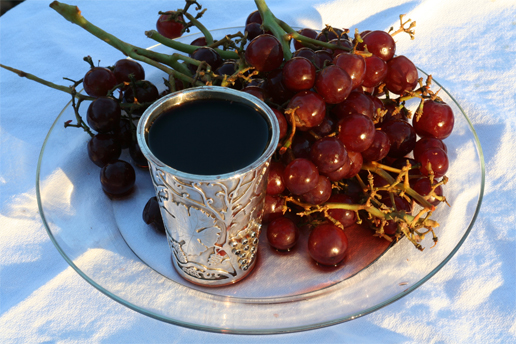what's so special about the grape
EVER WONDER...WHAT MAKES THE GRAPE SO SPECIAL?
When God put man
in the world, He created many pleasures for him to enjoy. Our
Rabbis, ever so cognizant of man and his role in Creation, established
various brachot, blessings, to help man acknowledge and appreciate that
all the good he receives in this world comes from God. The Anshei
Kenesset HaGedolah, the rabbinic body that prophetically composed the
brachot that we make today, determined six categories of brachot. They
established as a general rule, that the more significant the food, the
more specific the bracha we say on it.
As suggested by our title, the grape, or more
specifically the juice that comes from it, is somewhat special when it
comes to brachot. Its bracha is different from all other fruit
juices. When a juice is extracted from a fruit, the fruit has been
changed. Fruits that have been changed or have been processed are no
longer referred to as prei haaitz, fruit of the tree. Therefore, the
appropriate bracha on apple juice or orange juice is shehakol, the
general bracha that includes all foods. Why then, does wine merit
the more specific bracha of borei prei hagafen?
Wine is inherently different than all other
fruit juices. It’s the beverage that Halacha considers the most
important. The two reasons for this are intertwined: first, due
to the alcohol content of wine, it is mesamchei lev, it “gladdens the
heart” and secondly, it traditionally has played a central role in
social gatherings. It’s for this same reason that wine served in
the middle of a meal is the only beverage on which we make a separate
bracha.
With respect to the brachot we say on food in general, there are a few
other points of interest. For instance, from the time of the
Anshei Kenesset HaGedolah, until very recently, bread was the mainstay
of every person’s diet. Also referred to as “the staff of life”, it was
served at every meal to fill a person up. As the words of the
pasuk state, “… bread, the hearts of man satiates.” It is for
this very reason that the bracha we say on bread includes all the other
foods at a meal.
Another point is that while the brachot on fruit,
vegetables and grains use the formula, “borei prei . . .”, which
translates as “He created the fruit of . . . “, the bracha on meats,
water and other food stuffs uses the formula, “shehakol niheye bidvaro”
which translates as “. . . all that came into being according to His
word”. The reason for this is that a plant, whether it is
replanted or rejuvenated each season is considered to be created each
year. Therefore, foods that came from plants, whether they be fruits,
vegetables or grains, are referred to with the term borei, “He
created”. However, animals or water that live or last for many
years are referred to with the term “neheye” that “came into being”.
May this deeper understanding of the meanings of our
brachot make them more meaningful to us and help us to be more aware
and more fully appreciate that everything good that we receive in this
world comes from God.
Rabbi Eliezer Kessler
Houston, Texas
|
